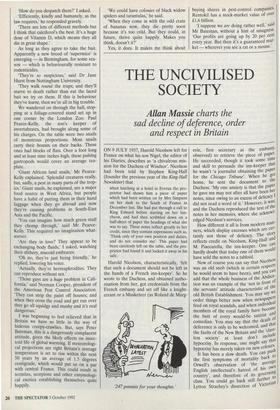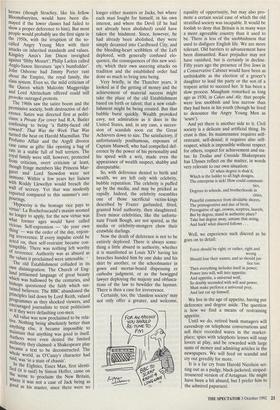THE UNCIVILISED SOCIETY
Allan Massie charts the
sad decline of deference, order and respect in Britain
ON 9 JULY 1937, Harold Nicolson left for France on what his son Nigel, the editor of his Diaries, describes as 'a chivalrous mis- sion for the Duchess of Windsor'. Nicolson had been told by Stephen King-Hall (founder the previous year of the King-Hall Newsletter) that
when lunching at a hotel in Evreux the pro- prietor had shown him a piece of paper which had been written on by Mrs Simpson on her dash to the South of France in December last. She had put through a call to King Edward before starting on her lun- cheon, and had then scribbled down on a half-sheet of paper the headings of what she was to say. These notes reflect greatly to her credit, since they contain expressions such as, `Think only of your own position and duties, and do not consider me'. This paper had been carelessly left on the table, and the pro- prietor had found it and locked it away in his safe.
Harold Nicolson, characteristically, 'felt that such a document should not be left in the hands of a French inn-keeper'. So he wrote to the Duchess, and obtained autho- risation from her, got credentials from the French embassy and set off like a knight- errant or a Musketeer (as Roland de Marg- `247 pennies for your thoughts.'
erie, first secretary at the embassy, observed) to retrieve the piece of paper. He succeeded, though it took some time and skill to persuade the inn-keeper that he wasn't 'a journalist obtaining the paper for the Chicago Tribune'. When he got home, he sent the document to the Duchess. 'My one anxiety is that the paper he gave me may not after all have been her notes, since owing to an excess of delicacy I did not read a word of it.' However, it was; and the Duchess reproduced the text of the notes in her memoirs, where she acknowl- edged Nicolson's services. How different it all is from modern man- ners, which display excesses which are cer- tainly not those of delicacy. The storY, reflects credit on Nicolson, and M. Piaccarella, the inn-keeper. One can hardly doubt that today one of them would have sold the notes to a tabloid.
Now of course you can say that Nicolson was an old snob (which in certain respects he would seem to have been), and you can add that the whole business of the Abdica- tion was an example of the 'not in front of the servants' attitude characteristic of the old British Establishment. You may say we order things better now when newspapers feed on royal scandals, and when individual members of the royal family have become the butt of every would-be satirist and comedian. You may say that the death of deference is only to be welcomed, and that the faults of the New Britain and the 'class- less society' at least don't include hypocrisy. In response, one might say that hypocrisy has merely taken on new colours.
It has been a slow death. You can Push the first symptoms of mortality back to Orwell's observation of 'the average English intellectual's hatred of his own country', and therefore of its governing class. You could go back still further. to Lytton Strachey's dissection of Victorian heroes (though Strachey, like his fellow Bloomsburyites, would have been dis- mayed if the lower classes had failed to show a proper deference to him). But most people would probably see the first signs in the 1950s, with the irruption of the so- called Angry Young Men with their attacks on inherited standards and values. Kingsley Amis's Jim Dixon inveighed against 'filthy Mozart'; Philip Larkin called Anglo-Saxon literature 'ape's bumfodder'. John Osborne had Jimmy Porter rant about the Empire, the royal family, the class system. Even so, the mild criticism of the Queen which Malcolm Muggeridge and Lord Altrincham offered could still provoke outraged protests. The 1960s saw the satire boom and the permissive society, both destructive of def- erence. Satire was directed first at politi- cians: a Private Eye cover had R.A. Butler confessing to being 'a flabby-faced old coward'. That Was the Week That Was turned the heat on Harold Macmillan. The Profumo Affair and the Argyll divorce case came as gifts: like opening a bag of rats in a stable full of bull terriers. The royal family were still, however, protected from criticism, overt criticism at least, though fringe members like Princess Mar- garet and Lord Snowdon were not immune. Within a few years her liaison with Roddy Llewellyn would breach the wall of secrecy. Yet that was modestly reported compared to this summer's out- pourings. :Hypocrisy is the homage vice pays to virtue': La Rochefoucauld's maxim seemed no longer to apply, for the new virtue was what former ages would have called vicious. Self-expression — 'do your own thing' — was the order of the day, enjoin- ing irreverence. If every impulse could be acted on, then self-restraint became con- temptible. There was nothing left worthy of reverence. Authority was as absurd as the values it proclaimed were untenable. its own old Establishment colluded in ts ?wn disintegration. The Church of Eng- land jettisoned language of great beauty which was hallowed by the centuries, and bishops questioned the faith which sus- tained believers. The BBC abandoned the principles laid down by Lord Reith, valued Programmes as they shocked viewers, and encouraged journalists to treat politicians as if they were defaulting con-men. All value was now proclaimed to be rela- tive. Nothing being absolutely better than anything else, it became impossible to Maintain that anything was good in itself. Authors were even denied the limited authority they claimed: a Shakespeare play became a text to be deconstructed. The whole world, as O'Casey's character had said, was 'in a state of chassis'. , In the Eighties, Essex Man, first identi- fied (it is said) by Simon Heifer, came on the scene to proclaim the New Britain, where it was not a case of Jack being as good as his master, since there were no longer either masters or Jacks, but where each man fought for himself, in his own interest, and where the Devil (if he had not already been abolished) could have taken the hindmost. Since, however, he had already been abolished, they were simply decanted into Cardboard City, and the bleeding-heart scribblers of the Left deplored, with generally confused elo- quence, the consequences of this new soci- ety, which their own sneering attacks on tradition and the established order had done so much to bring into being.
Very briefly, in the Thatcher years, it looked as if the getting of money and the achievement of material success might take the place of the old Establishment based on birth or talent; that a new estab- lishment might be being created. But that bubble burst quickly. Wealth provoked envy, not admiration as it does in the United States, and, in any case, a succes- sion of scandals soon cut the Great Achievers down to size. The satisfactory, if unfortunately posthumous, exposure of Captain Maxwell, who had compelled def- erence by the power of his personality and his speed with a writ, made even the appearance of wealth suspect, shabby and disreputable.
So, with deference denied to birth and wealth, we are left only with celebrity, bubble reputation. The celebrity is puffed up by the media, and may be pricked as rapidly. Indeed, the celebrity resembles one of those sacrificial victim-kings described by Frazer: garlanded, feted, granted brief authority, then slaughtered. Even minor celebrities, like the unfortu- nate Frank Bough, are not spared, as the media or celebrity-mongers chew their erstwhile darlings.
Now the death of deference is not to be entirely deplored. There is always some- thing a little absurd in authority, whether it is manifested as Louis XIV having his breeches handed him by one duke and his shirt by another, or the schoolmaster in gown and mortar-board dispensing ex cathedra judgment, or as the bewigged lawyer deploying the majesty and obfusca- tions of the law to bewilder the layman. There is then a case for irreverence.
Certainly, too, the 'classless society' may not only offer a greater, and welcome, equality of opportunity, but may also pro- mote a certain social ease of which the old stratified society was incapable. It would be foolish to deny that Britain is in many ways a more agreeable country than it used to be. There is less of the snobbishness that used to disfigure English life. We are more tolerant. Old barriers to advancement have been dismantled. Race prejudice may not have vanished, but is certainly in decline. Fifty years ago the presence of five Jews in a Conservative Cabinet would have been as unthinkable as the election of a grocer's daughter to lead the party or the son of a trapeze artist to succeed her. It has been a slow process. Maugham remarked as long ago as 1930, in Cakes and Ale, that people were less snobbish and less narrow than they had been in his youth (though he lived to denounce the Angry Young Men as `scum).
And yet there is another side to it. Civil society is a delicate and artificial thing. Its crust is thin. Its maintenance requires self- restraint, self-denial; it requires also self- respect, which is impossible without respect , for others, respect for achievement and sta- tus. In Troilus and Cressida Shakespeare has Ulysses reflect on the matter, in words very relevant to our own situation: 0! when degree is shak'd, Which is the ladder to all high designs, The enterprise is sick! How could communi- ties, Degrees in schools, and brotherhoods in cities, Peaceful commerce from dividable shores, The primogenitive and due of birth, Prerogative of age, crowns, sceptres, laurels, But by degree, stand in authentic place? Take but degree away, untune that string, And hark! what discord follows . . .
Well, we experience such discord as he goes on to detail: Force should be right; or rather, right and wrong ...
Should lose their names, and so should jus- tice too.
Then everything includes itself in power, Power into will, will into appetite; And appetite, a universal wolf, So doubly seconded with will and power, Must make perforce a universal prey, And last eat up himself.
We live in the age of appetite, having put deference and degree aside. The question is how we find a means of restraining appetite.
Until we do, retired bank managers will eavesdrop on telephone conversations and sell their recorded wares in the market- place; spies with telephoto lenses will snap lovers at play, and be rewarded with large sums of money and admiring articles in the newspapers. We will feed on scandal and cry out greedily for more.
It is a far cry from Harold Nicolson set- ting out as a pudgy, black-jacketed, striped- trousered version of d'Artagnan. He might have been a bit absurd, but I prefer him to the admired paparazzi.



















































 Previous page
Previous page